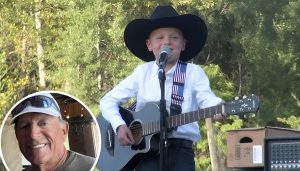In a world overflowing with fleeting trends and 15-second viral fame, every so often a video breaks through the noise—not because it’s flashy or clever, but because it’s real. One such moment came in the form of a toddler, no older than three, standing in his living room, wearing an oversized cowboy hat, singing a George Strait song with the kind of raw, unfiltered emotion that most seasoned artists spend a lifetime trying to capture. The clip quickly made its rounds across TikTok, Facebook, and Instagram, gathering millions of views in mere days. But while the internet was busy sharing, laughing, and tearing up, the deeper story—the one that explains why this performance meant so much—remained mostly untold.
Until now.
A Viral Video That Became a Movement
At first glance, the video seemed like any other charming family moment: a young boy swaying gently, eyes half-closed, singing a George Strait classic, “You’ll Be There.” His pitch wasn’t perfect. His words were slightly slurred in that toddler way. But what struck viewers was something intangible—an emotional depth far beyond his years. Comments poured in by the thousands: “Why am I crying at this?”; “He’s got a gift from God.”; “That little boy just reminded me of my grandpa.”
Even some country music legends took notice, with George Strait fan pages reposting the clip, and music forums lighting up with speculation about who the child was and where the video came from.
The Truth Behind the Tune
It wasn’t long before the boy’s mother stepped forward. In a heartfelt Facebook post, she shared the full story. According to her, the first time her son ever hummed anything that resembled a song, it was this same George Strait tune—“You’ll Be There.” She hadn’t thought much of it at the time, chalking it up to coincidence. But it later dawned on her that the song had been played during one of the most difficult days of their lives: her father’s funeral.
“He didn’t understand the words,” she wrote. “But somehow… he felt them.”

At the time of the funeral, her son was just a baby, still learning to talk. But apparently, the melody, the emotion in the room, and the spiritual weight of that moment made an imprint that even she didn’t fully recognize until years later. When he began singing the song on his own—unprompted, and with such heartfelt sincerity—she knew it wasn’t just mimicry. It was memory. Emotion. Connection.
Music as Memory, Music as Medicine
Neuroscientists have long studied how music embeds itself in the human brain, particularly in moments of grief, joy, or trauma. What this story exemplifies so beautifully is that music doesn’t require understanding—it only requires feeling. And feeling is something even the youngest among us can do.
George Strait himself is no stranger to loss. His daughter, Jenifer, passed away tragically in a car accident in 1986. In later interviews, he’s described music as one of the only ways he could process the pain. One of his most emotional songs, “You’ll Be There,” speaks directly to the idea of reunion beyond death—a belief that love continues, even after a final goodbye. Strait once said in an interview, “I believe in heaven, and I believe I’ll see her again.”
That belief now echoes in the voice of a toddler who never met George Strait, barely remembers his grandfather, and couldn’t possibly explain the theological complexities of loss and faith—but who felt something. And through music, he found a way to express it.
Reactions From Around the Globe
The story has since been picked up by multiple outlets and reshared across global platforms. Country music fans from Texas to Tokyo have chimed in, sharing their own stories of songs that became symbols of those they’ve lost. Some have called the moment “a spiritual experience,” while others have said it helped them finally cry over a loss they never processed.
Music teachers and therapists have reached out, highlighting how children often channel deep emotions through song before they have the language to express them. For one small boy, “You’ll Be There” wasn’t just a song—it was a message, a memory, and perhaps even a prayer.

A Reminder of What Matters
At its core, this story is not about internet fame. It’s not about viral metrics. It’s about the enduring power of love, memory, and music. A little boy, too young to understand death, unknowingly paid tribute to his grandfather in the most powerful way possible—not with words, but with a melody etched in his soul.
In a time when our feeds are flooded with noise, let this video remind us of something quieter—and far more lasting. That love echoes. That music heals. And that sometimes, even the smallest voice can carry the loudest truth.